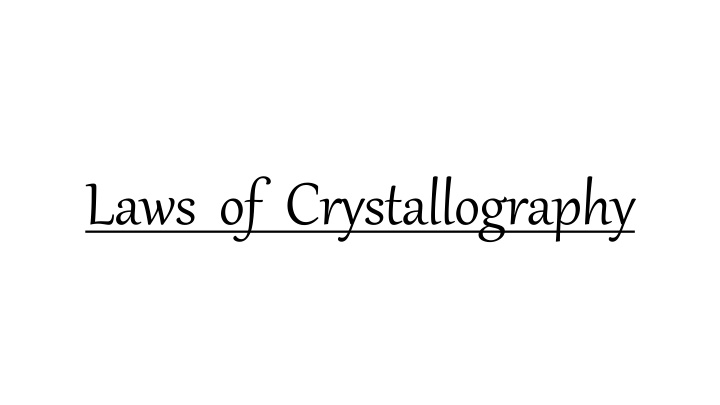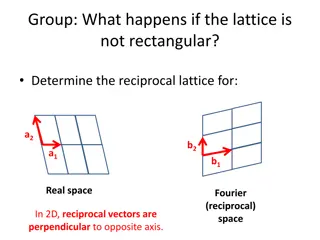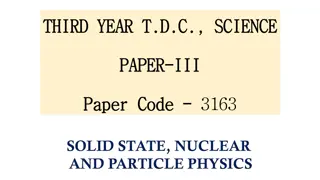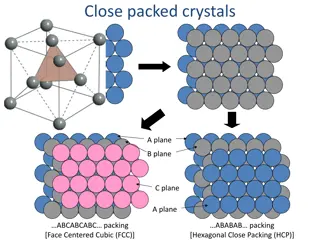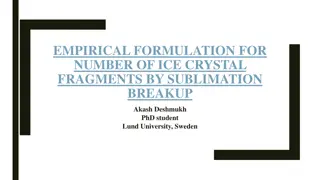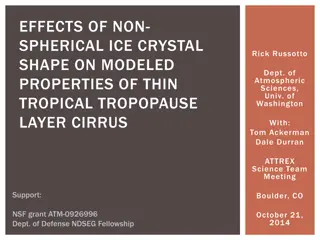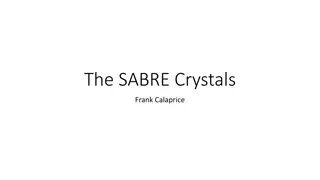Laws of Crystallography: Understanding Crystal Structures
Discover the fundamental laws governing crystal structures including the Law of Constancy of Interfacial Angles, Law of Symmetry, and Law of Rational Indices. Explore how these laws define the angles, symmetry, and indices of crystals, offering insights into their formation and properties.
Download Presentation

Please find below an Image/Link to download the presentation.
The content on the website is provided AS IS for your information and personal use only. It may not be sold, licensed, or shared on other websites without obtaining consent from the author.If you encounter any issues during the download, it is possible that the publisher has removed the file from their server.
You are allowed to download the files provided on this website for personal or commercial use, subject to the condition that they are used lawfully. All files are the property of their respective owners.
The content on the website is provided AS IS for your information and personal use only. It may not be sold, licensed, or shared on other websites without obtaining consent from the author.
E N D
Presentation Transcript
Thereare3lawsofCrystallography.Theyare 1.LawofConstancyofInterfacialAngles 2.Lawof Symmetry 3.LawofRationalIndices
1.LawofConstancyofInterfacial Angles -Thsanglebetweentheadjacentfaces isknownasInterfacialangleofthe crystalofaparticularsubstance. -Accordingtothislaw,itisalways constantforthecrystalsofthesame substance.
-Inspite of different sizes and mode of growth of crystal the interfacialangleissame. -The size and shape of crystal formeddependuponthe conditions ofcrystallization. -ThislawisalsoknownasSteno s Law.
2.LawofSymmetry Thereare3typesofsymmetry -Planeof Symmetry -Axisof Symmetry -Centreof Symmetry
1.PlaneofSymmetry Ifitispossibletodivide thecrystalinto2parts,one being mirrorimagetoother,thecrystalissaidto haveplaneofSymmetry. -Acubiccrystalhave a.Rectangularplaneof Symmetry b.DiagonalplaneofSymmetry
Rectangular plane of Symmetryhas3 planes ofSymmetry.
2.Axisof Symmetry Itisanimaginarylineoraxisaboutwhichthe crystalmayberotatedsothatitpresentsthesame appearancemorethanonceinarotationof360 . Thereare3typesinaxisofSymmetry. (a)Axisof 4 foldSymmetry (b)Axisof 3 foldSymmetry (c)Axisof 2 foldSymmetry
Axisof 4foldSymmetry Passingfromthecsntreof2opposite faces. TotalFaces=6 PairsofoppositeFaces=3 Angle= 90 Whenalongthisaxisthecubeisrotatedwewillget 4sameappearancesofthiscell.
Axisof 3foldSymmetry Passingfromoppositecornersalongwithbody diagonal Totalcorners= 8 Oppositecornerpairs =4 Angle=120 Whenalongthisaxisthecubeisrotatedwewillget 3sameappearances.
Axisof 2foldSymmetry Passingfromtwodiagonallyoppositeedges Totaledges=12 Pairsofoppositeedges=6 Angle= 180 Whenalongthisaxisthecubeisrotatedwewillget 2sameappearancesofthiscell.
Centreof Symmetry Passingfrombody center Onlyoneplaneof Symmetry
PlaneofSymmetry-Rectangular=3 - Diagonal = 6 AxisofSymmetry-4 fold=3 -3fold=4 2 fold = 6 - Center of Symmetry = 1 Total=23
